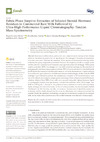Please use this identifier to cite or link to this item:
https://accedacris.ulpgc.es/jspui/handle/10553/78019
| Title: | Fabric Phase Sorptive Extraction of Selected Steroid Hormone Residues in Commercial Raw Milk Followed by Ultra-High-Performance Liquid Chromatography–Tandem Mass Spectrometry | Authors: | Guedes Alonso, Rayco Sosa Ferrera, María Zoraida Santana Rodríguez, José Juan Kabir, Abuzar Furton, Kenneth G. |
UNESCO Clasification: | 2391 Química ambiental 2301 química analítica |
Keywords: | Milk samples Steroid hormones Fabric phase sorptive extraction Liquid chromatography Mass spectrometry, et al |
Issue Date: | 2021 | Journal: | Foods | Abstract: | Hormones in edible matrices, such as milk, are a subject of concern because of their adverse effects on the endocrine system and cell signaling and the consequent disruption of homeostasis in human consumers. Therefore, the assessment of the presence of hormones in milk as potential endocrine-disrupting compounds is warranted. However, the complexity of milk as a sample matrix and the ultra-low concentration of hormones pose significant analytical challenges. Fabric phase sorptive extraction (FPSE) has emerged as a powerful analytical technique for the extraction of emerging pollutants from complex aqueous matrices. FPSE allows for substantially simplified sample handling and short extraction and desorption times, as well as the decreased use of organic solvents. It is considered a green alternative to traditional extraction methodologies. In this work, the FPSE technique was evaluated to perform the simultaneous extraction of 15 steroid hormones from raw milk without employing any sample pretreatment steps. Clean and preconcentrated hormone solutions obtained from FPSE of raw milk were analyzed using ultra-high-performance liquid chromatography–tandem mass spectrometry to achieve low detection limits, which ranged from 0.047 to 1.242 ng·mL−1 . Because of the presence of many interferents in milk, such as proteins, lipids, and sugar, the effect of fat content on the extraction procedure was also thoroughly studied. Additionally, for the first time, the effect of lactose on the extraction of steroid hormones was evaluated, and the results showed that the extraction efficiencies were enhanced in lactose-free samples. Finally, the optimized methodology was applied to commercial samples of cow and goat milk, and no measurable concentrations of the studied hormones were detected in these samples. | URI: | https://accedacris.ulpgc.es/handle/10553/78019 | ISSN: | 2304-8158 | DOI: | 10.3390/foods10020343 | Source: | Foods [ISSN 2304-8158], v. 10 (2), 343 (Febrero 2021) |
| Appears in Collections: | Artículos |
SCOPUSTM
Citations
7
checked on Jun 8, 2025
WEB OF SCIENCETM
Citations
8
checked on Feb 1, 2026
Page view(s)
120
checked on Feb 10, 2024
Download(s)
108
checked on Feb 10, 2024
Google ScholarTM
Check
Altmetric
Share
Export metadata
Items in accedaCRIS are protected by copyright, with all rights reserved, unless otherwise indicated.
